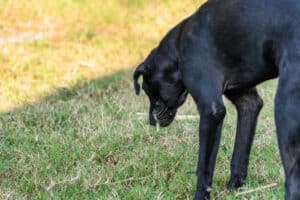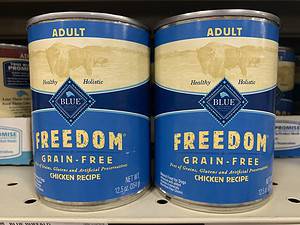Birdseed is a pretty common staple in many people’s homes. After all, people love the sight of birds fluttering around their yards, happily feasting on their seeds. However, is birdseed safe for dogs?
Some dogs seem to be attracted to the presence of birdseed, whether it is in a bag or scattered around a yard. It isn’t exactly a very common thing for dogs to try and eat, but it isn’t exactly rare, either.
In this article, we’ll talk about the potential dangers to your dog if they consume birdseed, as well as the common symptoms you should watch out for. If your dog has consumed birdseed, keep reading to learn what steps you need to take.
Common Ingredients in Birdseed
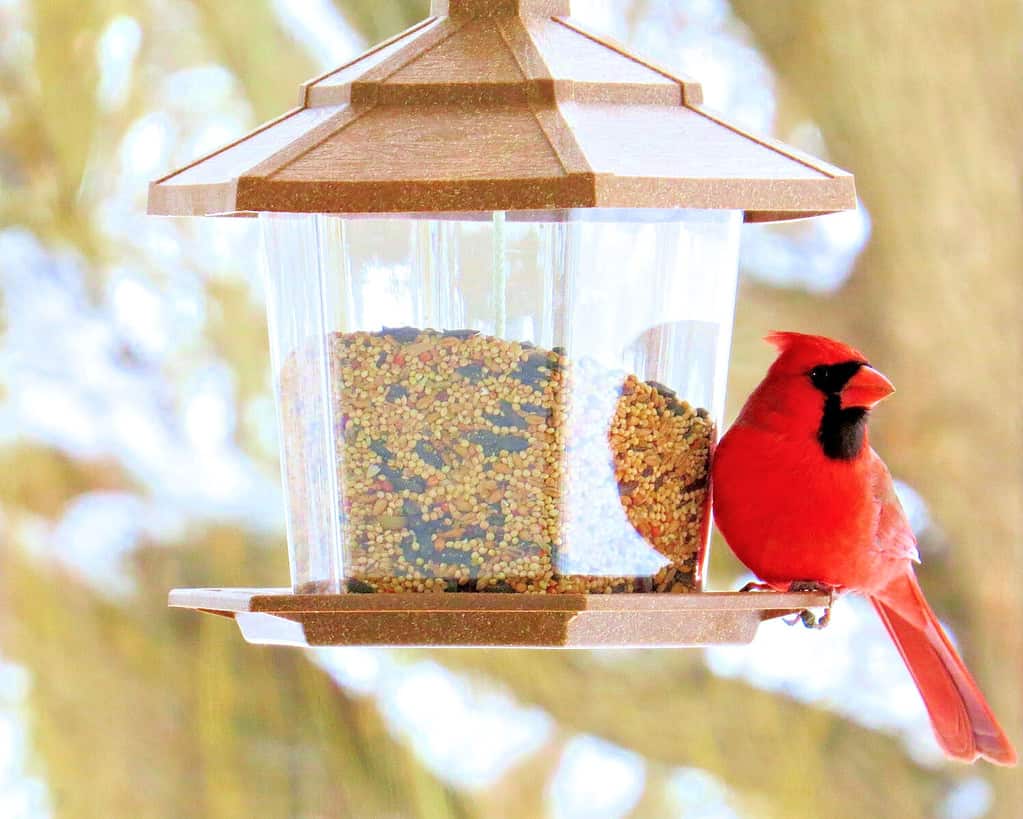
Some birdseeds are specifically designed to attract certain birds, such as cardinals.
©MLHoward/Shutterstock.com
Of course, all birdseed is a little bit different. Birds actually like several different kinds of seed, and therefore, birdseed tends to include several different ingredients.
Often, birdseed is created to attract a particular kind of bird. For instance, you may find mixes specifically for songbirds and others for cardinals. Each mix aims to provide seeds that that particular kind of bird likes.
Birdseed can contain a wide range of seeds and grains, and the exact composition may vary depending on the brand and type. Common ingredients include sunflower seeds, millet, safflower seeds, peanuts, corn, and oats.
Here’s a quick breakdown of each kind:
- Sunflower Seeds: A favorite among many bird species, sunflower seeds are high in healthy fats and protein. There are two main types: black oil sunflower seeds (smaller, thin-shelled) and striped sunflower seeds (larger, thicker-shelled).
- Millet: Millet seeds are tiny and come in various colors. They are popular with sparrows, finches, and doves.
- Safflower Seeds: These seeds are known for their bitter taste, which makes them less attractive to squirrels. Cardinals and grosbeaks prefer them.
- Peanuts: Peanuts provide a good source of protein and healthy fats. They are enjoyed by woodpeckers, jays, and nuthatches.
- Corn: Whole or cracked corn is a staple in many birdseed mixes. It’s relished by larger birds like crows and doves.
- Oats: Oats are a good source of carbohydrates and are often included to add bulk to birdseed mixes.
Some of these ingredients are safe for dogs, while others are not. It’s important to figure out the exact seeds your dogs is eating to determine exactly whether it is safe or not.
The Dangers of Bird Seed for Dogs
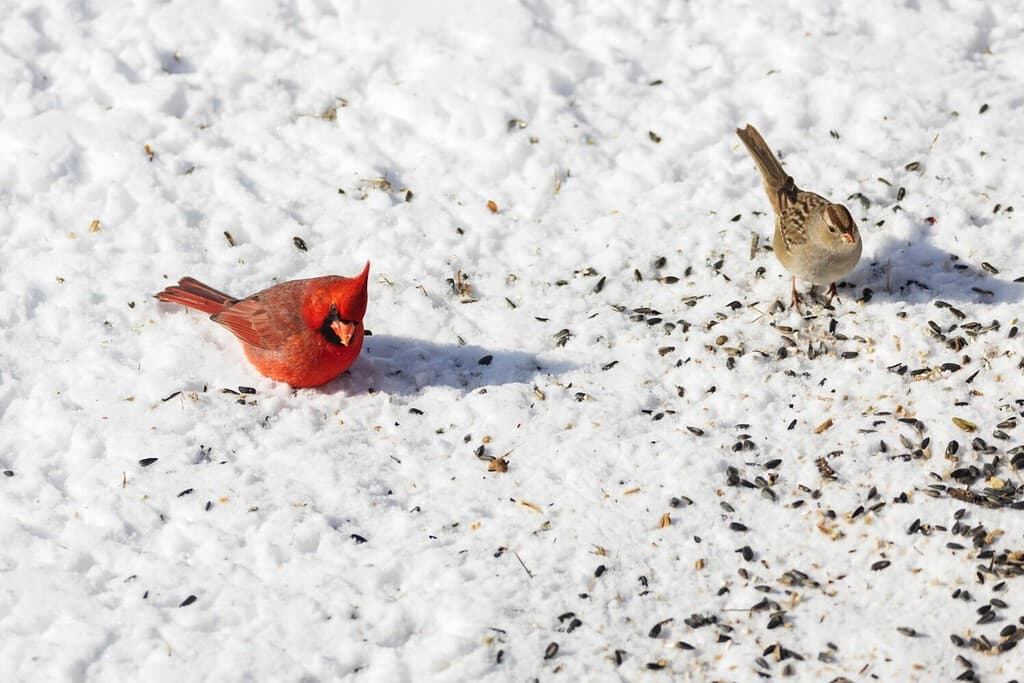
Small seeds in birdseed can be a choking risk for dogs plus may cause allergic reactions.
©Martina Sliger/Shutterstock.com
Bird seed was, of course, designed for birds – not dogs. Therefore, it can present a risk to dogs when consumed. However, the exact risks will vary from dog to dog and birdseed to birdseed.
Mixed bird food often contains seeds and grains that may not be part of a dog’s usual diet. Some of these seeds are very full of fat, which can cause digestive issues for dogs if consumed excessively. Sunflower seeds would fall into this category.
Sometimes, seeds can also be a choking risk, especially for smaller breeds and puppies. Eating whole seeds without chewing them properly can lead to choking. If it doesn’t, too many seeds can pile up in the digestive tract and cause intestinal blockages.
Dogs can also have allergies, just like people. Some of these allergies may be to the ingredients found in bird seeds, such as peanuts. Allergic reactions can range from minor to exceptionally severe.
Some prepackaged bird food may contain mold, especially if not new or the bag has been opened. Ingesting moldy birdseed can lead to serious health problems for dogs, including gastrointestinal upset. Moldy birdseed isn’t good for birds either, however!
Common Signs Your Dog Ate Bird Seed

You may notice diarrhea and vomiting if your dog ingests too much birdseed.
©Kuznetsov Alexey/Shutterstock.com
If your dog has eaten too much birdseed, they may develop some negative symptoms. The exact amount that’s considered “too much” will vary from dog to dog. Smaller dogs tend to get symptoms when eating less bird seed, as they have a smaller body weight. However, dogs that are allergic may show symptoms with very little birdseed.
The most common reaction to dogs ingesting bird seed is gastrointestinal problems. Usually, this includes vomiting and/or diarrhea. Often, this occurs shortly after your dog eats the bird seed and is the body’s way of trying to eliminate the improper food from their body.
If the birdseed was not properly chewed or if it includes large, hard seeds, your dog may exhibit signs of choking or coughing. They might paw at their mouth or appear distressed.
If your dog is coughing and making noises, they are not choking. Never shove your fingers into a dog’s mouth. This may result in injury for you, but it may also push the obstruction further into your dog’s throat. (You should never shove your fingers into any choking animal’s mouth unless you can see the obstruction and pull it out easily.)
Some dogs may show signs of discomfort or pain, likely in their abdominal area. Many dogs will whine, pace, or seem restless. Often, this goes hand-in-hand with other gastrointestinal problems.
Rarely, dogs may appear lethargic after eating birdseed. Usually, this happens when the dog is in pain, which causes them not to want to move all that much. They may also be tired or dehydrated from vomiting.
If your dog is allergic to a specific seed or grain in a bird mix, they may have an allergic reaction. Minor reactions may just involve itching, especially on the dog’s paws. If they suddenly seem very itchy, it may be due to the birdseed.
Dogs with severe allergies may exhibit swelling or respiratory issues.
Monitoring Your Dog’s Condition
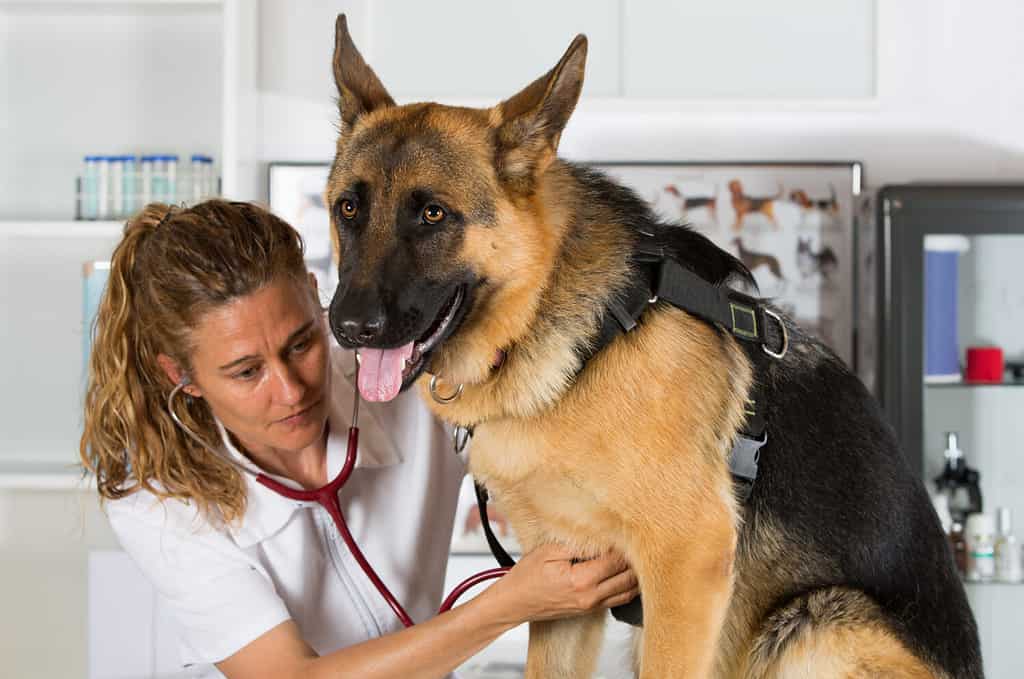
While dogs don’t usually need to go to the vet for eating, they absolutely need to sometimes!
©135pixels/Shutterstock.com
It’s important to remember that every dog is different. Some dogs may ingest birdseed and be completely fine. However, other dogs may only eat a little bit and start feeling symptoms right away. It’s crucial that you take the situation seriously, either way.
When in doubt, reach out to your vet with questions. Often, your vet can provide you with information on what to watch for that may signal a more serious problem. It’s best to provide them with details about the type and quantity of bird food your dog ingested. If you can provide the ingredient list from the bag, even better.
Do not induce vomiting unless recommended by your vet. Certain seeds or components may not react well and can cause damage on the way back up. Until you can get professional help, keep your dog calm and in a quiet, comfortable environment.
Steps to Take if Your Dog Ate Bird Seed
If your dog has eaten a substantial amount of birdseed, here are some steps you need to take:
- Contact a veterinarian: You should contact a vet if your dog has eaten a lot of birdseed. When in doubt, it is best to contact them. Lots of birdseed can lead to impaction, which is potentially deadly.
- Don’t panic. Luckily, eating birdseed is rarely deadly, and most dogs do not need veterinary care. In many cases, there isn’t much you need to do.
- Observe your dog. Keep a close eye on your dog’s behavior and symptoms. This information will be valuable when you speak with the veterinarian. Not any symptoms your dog has, such as vomiting, choking, or allergic reactions.
Preventing Future Incidents
While addressing the immediate situation is crucial, it’s equally important to take steps to prevent future incidents involving birdseed and your dog. A dog that ate birdseed once will probably do it again – even if it made them sick.
Be sure to securely store your birdseed, preferably in a location inaccessible to your dog. You should also supervise your dog when they are anywhere that may contain vast amounts of seeds, such as around your bird feeders.
Training can also be helpful. With enough patience, you can train your dog to avoid birdseed and other hazards.
The photo featured at the top of this post is © Ami Parikh/Shutterstock.com
Thank you for reading! Have some feedback for us? Contact the AZ Animals editorial team.




